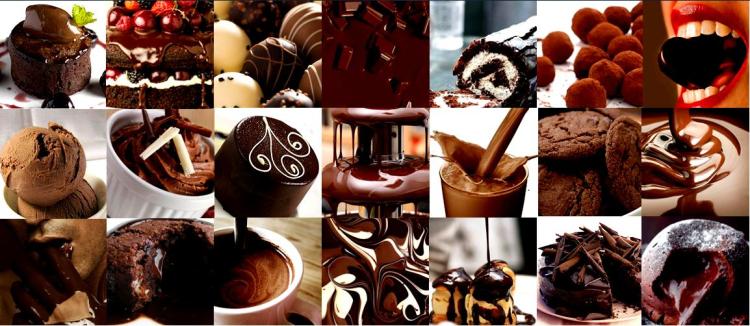THIS ARTICLE WAS inevitable.
Believe me, I’d tried to think of something a bit less autobiographical to write about, like rhubarb or Seville oranges, but it’s true: resistance is futile.
So after having decided that a whole post on pearl barley was not going to be all that interesting for me (or for you, most likely), it became quite clear that I had to write about the thing that so many people can’t seem to resist. But what is it about chocolate that people like so much? I think it’s interesting that this seductive substance, as humble as it is in its raw form of the cocoa bean, has been so revered for so long. From the Mayans who claimed it was the ‘food of the Gods’ to the pâtisseries and chocolateries of Paris, it still has a certain degree of opulence. Is it the smell? Its taste? Or is it just plain addictive? Well, I’m sure that’s what 275lb woman with a chocolate éclair hanging out of her mouth at 2 o’ clock in the morning would like to say, but after doing some reading on the topic, I’m not quite so sure.
Like all sweet foods, chocolate turns on the serotonin tap in our bodies which makes us feel good – the ‘sugar rush’ – which is not too dissimilar to the feelings drug users are looking for when after a fix. Don’t worry, though, we aren’t drug addicts – we’re ‘chocoholics’. Take celery – something like celery just doesn’t have the same effect on our bodies, no matter how much we want it to. Nobody I know thinks ‘God, give me celery!’ when they’re slumped across their desk losing the will to live or fighting cravings just before bed. We’re looking for a quick rush of happiness, and chocolate is one of the quickest ways to do this, not least one of the tastiest. This surge of serotonin is what makes us want it when we’re stressed, or bored, or depressed – but are we really addicted to that?
The experts say no. And I think I agree – if I really was addicted, I’d be thinking about it even when I’m not eating it and I’d be shaking uncontrollably whilst sat in a lecture and I’m not that bad. I promise you. I like to think I’d be able to polish off an entire corner of a Lindt factory, but in reality I reach a point where I don’t even want to see any more of the stuff, and would be happy to go without it for some time. (This doesn’t happen often, I admit, but it does). What’s more is that although these experts, whoever and wherever they are, agree that chocolate has some magical hormone-changing properties about it, apparently so do lots of other foods. Chillis stimulate nerve endings, for example, watermelons can speed up your circulation, and pumpkin seeds can keep sex hormone production at optimum level. So chocolate’s not that special in that respect. Sorry, 275lb woman.
However, do boyfriends bestow boxes of chillis upon their girlfriends on February 14th? Do watermelons smell so deliciously deep and rich? And it’s a hard one, but do pumpkin seeds melt slowly and seductively in the mouth? No, to all of the above, but chocolate does. Chocolate has had, definitely more than celery in any case, centuries’ worth of emotions and ideas pinned onto it that it is now a fully-fledged part of Western existence. It has taken a starring role in literature and film, it’s the only food that makes an appearance at Valentine’s Day, Easter and Christmas, and it is endlessly marketed with memorable advertisements – Ferrero “Ambassador, with these Rocher, you’re really spoiling us” Rochers, drum-playing gorillas and The Milkybar Kid, to name a few. Chocolate assaults the senses, so heavily in fact, that we can’t forget chocolate even if we tried. So when we’re stressed, bored or depressed, it’s no wonder that we reach for (or even just think about) a bar of chocolate.
And I think part of chocolate’s appeal is its naughty side – I’d be lying if I claimed eating fifteen packs of Hersheys Kisses was a good idea, because it isn’t. Together with the sugars it contains, it’s the fat in chocolate that drives us to keep wanting it again and again. It might come as no surprise, therefore, that chocolate is the most-frequently craved (and most-frequently given-into) food when on a diet – for men and women – because it is satisfying, stimulating and a little bit sinful. It might have something to do with the vending machines on the way out of the gym, too.
Giving in once in a while is okay, because we’d all rather have a little crack in the wall now than have the whole wall tumble down later, right? Yes – research has shown that dark chocolate (semi-sweet, as you might know it) is not all that bad anyway. It’s full of antioxidants and a little bit a day can help our bodies regulate glucose levels and it might even be effective in preventing cancer. However it’s worth pointing out that that doesn’t mean we can gorge, so put down that eighth Mars bar and get back on the treadmill.
But if that wasn’t enough incentive to continue eating chocolate (in moderation of course), here is a collage of some of the ways in which we can enjoy the dark stuff – and not a stick of celery in sight. Please enjoy and refrain from licking your screen.

Too late I already licked my screen 😥
Long live the dark chocolate! In moderation, of course 😉 and when it’s not in the aftermath of mood swings and a whirlwind of anger.
Absolutely. Thanks for reading!
A great post! I also wanted to lick my screen! 😉
Thank you! You can do so, although I can’t guarantee it’ll taste as good as chocolate.